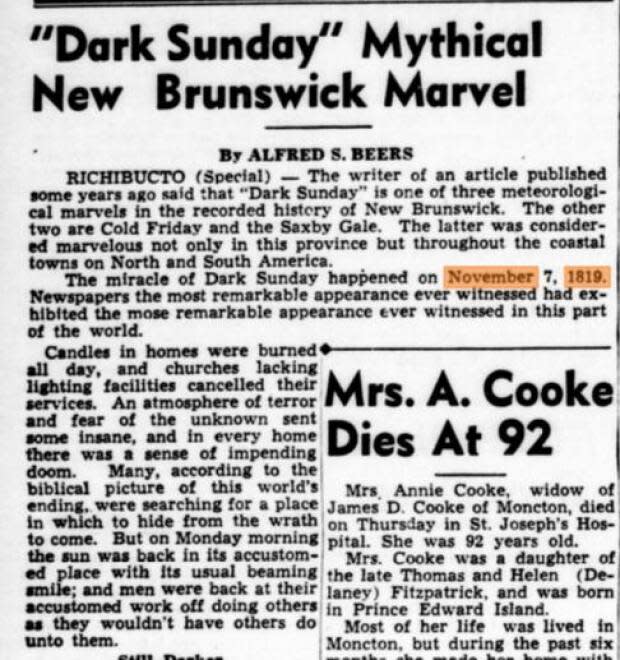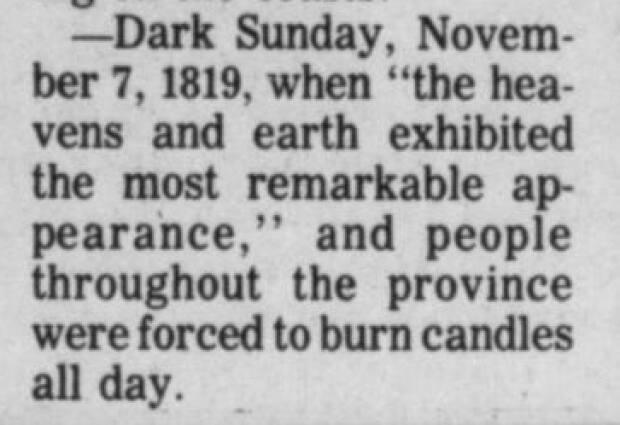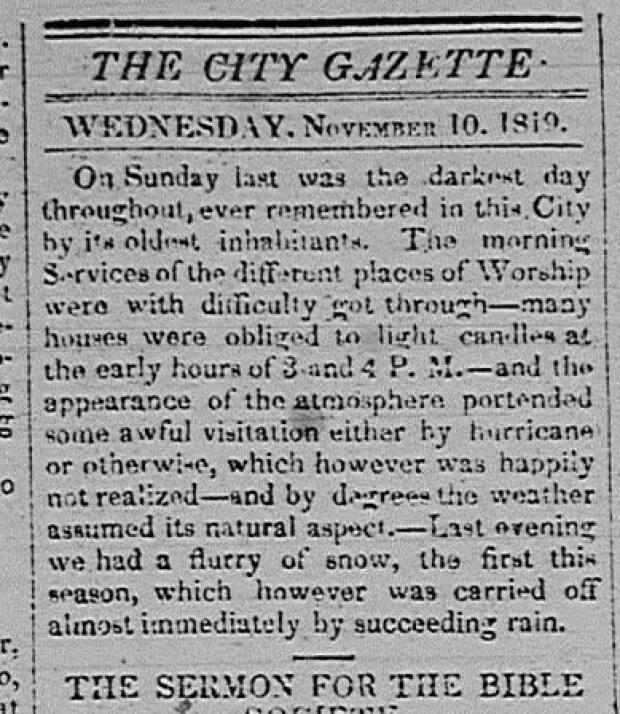It's been 201 years since New Brunswick's darkest day

It's been 201 years since the day the sun just never showed up in New Brunswick.
That's how Sunday November 7, 1819 became known as 'Dark Sunday.'
The lack of light reportedly led to mild hysteria from Saint John to Woodstock, as people prepared for an upcoming apocalypse.
And to this day no one is exactly sure what happened.
Although, there are some theories.

Historical articles
Of course, there are no photographs of that notorious day in New Brunswick history.
But there are several newspaper articles describing the event.

A search at the New Brunswick Provincial Archives brings up about a dozen articles that have been written about that Dark Sunday over the years.
"An atmosphere of terror and fear of the unknown sent some insane, and in every home there was a sense of impending doom. Many, according to the biblical picture of this world's ending, were searching for a place to hide from the wrath to come," stated an article by Alfred S. Beers in the Moncton Daily Times written about Dark Sunday Oct 11, 1954.
"A black veil seemed to have been spread across the sun and there were those who believed that the end of the world was approaching," stated another article found at the archives without a credited author.
"People were running for cover and they feared the wrath of God in New Brunswick and it was probably the end of the world," said Josh Green, a photo-archivist at the New Brunswick Provincial Archives.
Each article often ends with a similar ominous ending, something along the lines of scientists being unable to explain just what it was that had occurred.

The "Phenomenon of 1819" is also documented in an article from the Montreal Star. Re-published in the New York Times 60 years later, it differs from the New Brunswick articles. Aside from the obvious geographical difference, it also includes the presence of a mysterious rain.
After detailing a typical cloudy morning J.H. Dorwin wrote "...the whole sky became terribly dark, dense black clouds filling the atmosphere, and there appeared to be something in the nature of soap-suds, and was found to have deposited after settling a substance in all its qualities resembling soot."
But Dorwin places his account of 'Dark Sunday' on November 8, 1819, an incorrect date. But also writes the same thing happened again two days later.
"Everybody was more or less alarmed, and many were conjectures as to the cause of the remarkable occurrence. The more sensible thought that immense woods or prairies were on fire somewhere to the west, other[s] said that a great volcano must have broken out in the Province, still others asserted that our mountain was an extinct crater about to resume operations and make the city a second Pompeii."
Dorwin's article then details a sudden clash of lightning, every bell in the city suddenly ringing, more sooty rain, followed by a church cross crashing down and shattering. All perfectly terrifying.
What was Dark Sunday?
According to Green's research there are no known eclipses or astrological events that line up with the specific date that marks Dark Sunday. Nor were there any forest fires or exploding volcanoes.
But what he did find is a primary document.
A primary document is any article or account from someone who was there at that specific period in history in question.
In this case it's an article in the Saint John City Gazette, published Wednesday, Nov. 10, 1819, just three days after 'Dark Sunday.' All the previous articles were written years, decades, sometimes 150 years later.
It reads in its entirety "On Sunday last was the darkest day throughout, ever remembered in this City by its oldest inhabitants. The morning Services of the different places of Worship were with difficulty got through – many houses were obliged to light candles at the early hours of 3 and 4 P.M - and the atmosphere portended some awful visitation either by hurricane or otherwise, which however has happily not realized – and by degrees the weather assumed its natural aspect. - Last evening, we had a flurry of snow, the first of this season, which however was carried off almost immediately by the succeeding rain."
It didn't even make the first page.

"It was kind of a very minor news story even in the original Saint John reporting of it," said Green. "But it spiraled and grew from there over 200 years to something much grander."
A centuries old example of blowing things out of proportion according to Green.
Or maybe not. But either way, it's likely we'll never know for sure.


